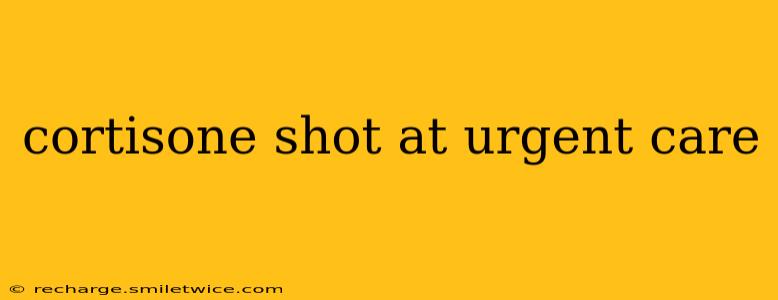A cortisone shot, also known as a corticosteroid injection, can provide fast relief from pain and inflammation. Many people wonder if urgent care is the right place to receive this treatment. This comprehensive guide will answer your questions and help you understand when a cortisone shot at urgent care is appropriate and what to expect.
What is a Cortisone Shot?
Cortisone shots are injections of corticosteroids, powerful anti-inflammatory medications. These medications work by reducing swelling, pain, and inflammation at the injection site. They are commonly used to treat a variety of musculoskeletal conditions, including:
- Bursitis: Inflammation of the bursae, fluid-filled sacs that cushion joints.
- Tendinitis: Inflammation of tendons, which connect muscles to bones.
- Carpal tunnel syndrome: Compression of the median nerve in the wrist.
- Arthritis: Joint inflammation, including osteoarthritis and rheumatoid arthritis.
- Back pain: Often stemming from muscle strains, ligament sprains, or disc problems.
Can You Get a Cortisone Shot at Urgent Care?
Yes, some urgent care clinics offer cortisone injections. However, not all urgent care facilities provide this service. The availability depends on the clinic's staffing, resources, and the specific expertise of the medical professionals on site. It's crucial to call ahead and confirm whether cortisone shots are offered before visiting.
What Conditions Might Warrant a Cortisone Shot at Urgent Care?
Urgent care is best suited for treating acute conditions that require immediate attention but aren't life-threatening. A cortisone shot might be considered in urgent care for conditions like:
- Severe joint pain: Sudden onset of intense joint pain that significantly impairs movement and daily activities.
- Acute bursitis: Sudden, painful inflammation of a bursa, often caused by injury or overuse.
- Aggravated tendonitis: A sudden flare-up of tendonitis causing significant pain and disability.
What Happens During a Cortisone Shot at Urgent Care?
The procedure is generally straightforward. A healthcare provider will:
- Cleanse the injection site: This helps prevent infection.
- Administer the injection: The injection is typically given using a small needle.
- Apply a bandage: To prevent bleeding and infection.
The entire process usually takes only a few minutes.
Are There Any Risks Associated with Getting a Cortisone Shot at Urgent Care?
While generally safe, cortisone shots carry potential risks, including:
- Infection: As with any injection, there's a small risk of infection at the injection site.
- Skin discoloration: Temporary changes in skin pigmentation can occur.
- Bleeding or bruising: These are common side effects.
- Joint weakening: Repeated injections into the same joint may weaken the joint over time.
- Increased blood sugar: Corticosteroids can temporarily increase blood sugar levels.
What is the Recovery Time After a Cortisone Shot at Urgent Care?
Recovery time varies depending on the condition being treated and the individual's response. You may experience some minor discomfort or soreness at the injection site for a few days. Most people can resume their normal activities shortly after the injection.
When Should I See a Specialist Instead of Urgent Care for a Cortisone Shot?
For chronic conditions, complex cases, or conditions requiring ongoing management, it's best to consult a specialist, such as a rheumatologist or orthopedist. These specialists have more in-depth knowledge and experience in managing such conditions. They can provide a more comprehensive diagnosis and treatment plan.
What are the Alternatives to Cortisone Shots?
Several alternatives exist depending on the underlying condition. These include:
- Physical therapy: To strengthen muscles and improve joint mobility.
- Nonsteroidal anti-inflammatory drugs (NSAIDs): Over-the-counter medications like ibuprofen or naproxen.
- Rest and ice: To reduce inflammation and pain.
This information is for general knowledge and should not be considered medical advice. Always consult with a healthcare professional for diagnosis and treatment of any medical condition.
